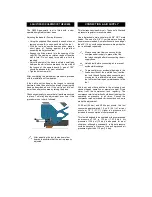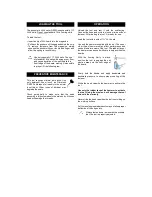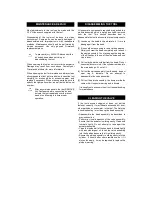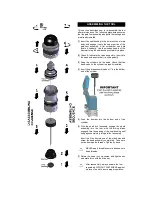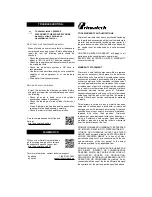
MAINTENANCE & REPAIR
Most adjustments to the tool can be made with the
3/16" Allen wrench supplied with the tool.
Disassembly of the tool must be done in a clean
environment. Some parts can be easily damaged if
disassembled with improper tools or by inadequate
methods. Maintenance should only be performed by
trained personnel. Use only genuine Primatech
replacement parts.
To prevent injury, ALWAYS disconnect the
air supply hose when servicing or
disassembling the tool.
When servicing the tool, do not twist or force any parts.
Damage may result from such abuse. Contact your
Primatech distributor for more information.
When opening the tool for maintenance, always clean
all components of dirt, grit, or particles. Inspect the tool
carefully for broken parts or excessive wear, and
replace if necessary. When ordering parts, be sure to
specify the right part number, as well as the tool serial
number.
After any maintenance to the tool, REMOVE
ALL Fasteners before connecting air and
actuate the tool repeatedly over a piece of
wood or subflooring to insure proper
operation.
DISASSEMBLING THE TOOL
All pneumatic components required are packed in a
module assembly which is simply inserted & removed
from the tool. This section describes how to
disassemble the tool to access its internal components.
[1] Loosen up the head lock and rotate it ¼ turn to
disengage it from the head.
[2] It is usually not necessary to remove the head cap.
Simply unscrew the head completely and take out
the whole assembly. You may engage the long arm
of the Allen key into one of the side holes and use
it as a lever.
[3] Pull out by hand the cylinder from the head. Do not
use screwdriver or vise. If the cylinder remains into
the main body, pull it out of it.
[4] Pull out the valve assembly from the head. Inspect
wear ring & lubricate. Do not attempt to
disassemble the valve assembly.
[5] Pull out the piston assembly; the bumper will also
come with it. Inspect wear ring and lubricate.
It is usually not necessary to pull-out the seal bushing
for maintenance.
CLEANING THE VALVE
If the tool becomes sluggish or does not set the
fastener correctly, it may indicate excessive dirt, dust,
other particles, or even water, in the tool. The first step
in troubleshooting is to clean up the head assembly.
• Disassemble the head assembly as described in
previous section.
• Perform a visual inspection of the valve assembly.
Ensure that the actuator is sliding easily. Clean and
lubricate lightly. Do not attempt to take apart the
actuator assembly.
• Clean the inside wall of the head and lubricate lightly
with a non-detergent oil. Insert the valve assembly
into the head and ensure that it is sliding easily.
• Ensure the piston assembly is sliding easily into the
cylinder. It should offer some resistance, but if it
moves too easily, it may be required to replace the
piston wear-ring.


